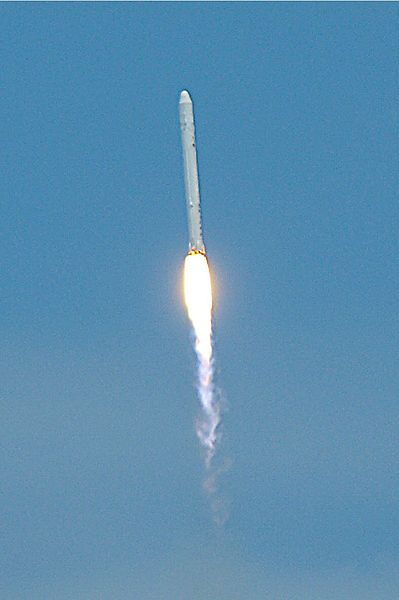Commercial Human Spaceflight
>> Friday, June 4, 2010

The Falcon 9 test flight, just launched successfully, is unmanned (as all the best test flights are), but it's a very important test flight. At this time SpaceX is an outlier on the notion that commercial ventures can make effective heavy lift rockets and, potentially, send people into space.
This is thrilling for many. It's probably a bit scary for several still entangled in the Constellation Program, especially given its uncertain future. Some (many of whom were all warm and fuzzy about commercial human spaceflight until it became competition) are probably a bit worried or frustrated.
I'm not. I'm thrilled it was a success (though I don't know yet how successful it was).
This is a great thing. Not just for SpaceX. Not just for commercial spaceflight (human or otherwise). Not just for America or any other country. Why?
Because every time space becomes more accessible, every time we find a new way to get there (especially given the dearth of truly new rockets the past few decades), every new option we open up, makes the possibility of really exploring the universe, really making a home in space, really colonizing the moon or orbit . . . just a little less impossible.
Will Constellation, in some slimmed down form, survive? I have no idea. But having another possibility, another option out there not only forces NASA to compete and excel, but it does the same for Space X. Best case, when we need to get astronauts back to the ISS or, perhaps, even send out a vehicle to do more, we may have another option than we did before.
Now, I feel strongly that the NASA standards out there for safety, redundancy and reliability, for operability and control of manned space vehicles is still pertinent even to commercial ventures, especially if we're putting astronauts out there.
But it's a key step. In the end, for space travel to mean something, it's going to have to belong to all of us, not just a handful of specially trained highly educated specialists or pilots. And this, this is a step along that path.
Congrats.






.jpg)











.jpg)



Thx, for sharing.
I hope it works out.
I agree. Enhanced accessibility is key. I still wish Arthur C. Clarke's timeline had been successful, though; I'd have loved to take a TWA flight to a revolving space station!
I'm sure you are using the word "complete" loosely, since Space X is not showered with taxpayer money. Not so hard to "compete" when you don't have to worry about profitability. I'm sure you meant compete in the sense of pushing each other to excellence. I saw an ad in the paper the other day where the new spaceport in New Mexico is letting bids to pave the runway. Slowly but surely, they are working on it. I am going down past there in a few days and will see if there is any visible activity from the highway. Pictures yield nothing but sagebrush and yucca plants and an antenna right now. But a proud "Future home of..." sign next to I-25 exit 92 or thereabouts.
Max,
Private companies due compete with the government, the difference between gov vs. private company competition and company vs company competition is the government likes to lose.
If NASA has to deliver a so many tons to orbit, they can now look at the cost of doing it themselves vs. hiring it out. So any new NASA rockets have to take into consideration the lower cost per ton to orbit that Space X can provide. That is what killed the Ares I, it couldn't compete costwise with the Falcon.
Now since we have commercial companies who might be sending humans to space, do you think we need a rescue vehicle?
In terms of competition, I think it just forces NASA to choose the best company. The shuttle was designed and built mostly by contractors (I could be wrong about this). So, it will force the contractors to develop better spacecraft. SpaceX is competing with Boeing and NASA is one of the battlegrounds. This is good because this battle is like Apple vs Microsoft, all in house vs. just producing one part.
YEAH!